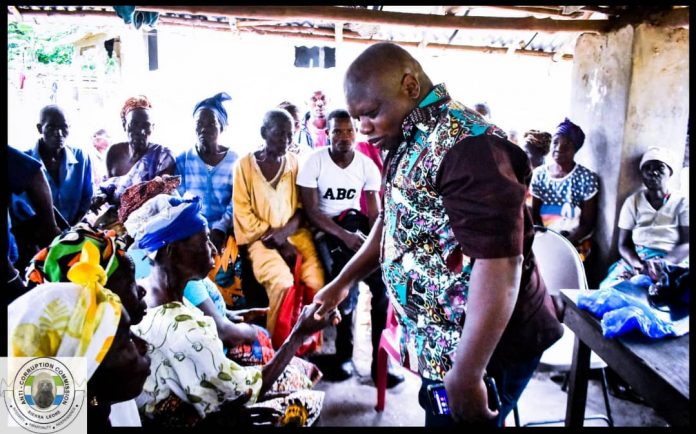By Alim Jalloh
The Deputy Commissioner of the Anti-Corruption Commission (ACC), Augustine Foday Ngobie has concluded his first set of visits to the Social Safety Nets (SSN) payment points across the regions. The visit served to ensure that the grievance redress mechanism (GRM) role, which the commission plays in implementing the SSN, is emboldened and up tight.
The visit commenced on Thursday 3rd October 2019, with the first phase of visits covering Bombali and Kono districts respectively. The SSN is the World Bank’s Board of Executive Directors’ approval of support for Sierra Leone’s efforts to create a strong social safety net system that will identify and assist poor and vulnerable households, following the end of the pilot program in 2018.
According to the World Bank, while economic growth has been strong in Sierra Leone, poverty and food insecurity have remained very high and human development indicators such as maternal health and survival are weak. This prompted the introduction of the SSN, because it reaches the poorest of families and helps those who have been left behind. The SSN is making direct cash transfers to households in Kono, Bombali, Moyamba, Bo, Kenema, Port Loko, Tonkolili Kailahun and Western Rural districts, usually to women, who tend to spend the money in ways that benefit the family. Eventually, the system has been scaled up to 9 of Sierra Leone’s districts from 4 in 2018, reaching poor families across the country.
Speaking to beneficiaries of the SSN across the regions, DC Ngobie said that the role of the commission in the SSN program is to strengthen the grievance redress mechanism (GRM) and anti-corruption measures during the payment process. He furthered that the ACC is part of the process to also ensure that the exact amount gets to the right people devoid of abuse.
He encouraged the beneficiaries to use the funds in benefitting them and their relatives. “This project adequately reflects the aspirations of the New Direction and it will be a remarkable milestone in enhancing the efforts of government to importantly simmer down the number of Sierra Leoneans below the poverty line; it will not only put food on the table of the poorest, it will also enable them to access social services like health and education”, DC Ngobie concluded.
Other monitoring visits covered Moyamba Bo, Kenema, Kailahun and Western Rural districts.
The development objective of the SSN Project for Sierra Leone is to establish the key building blocks for a basic national safety net system and to provide income support to extremely poor households in Sierra Leone.




